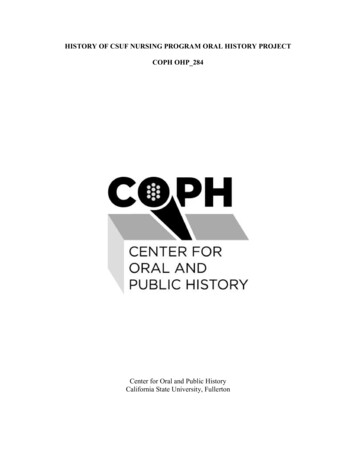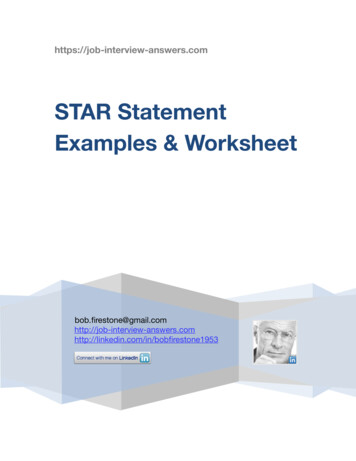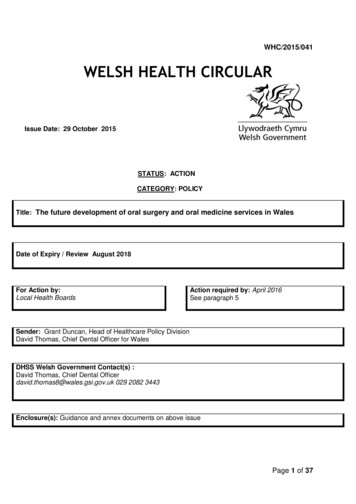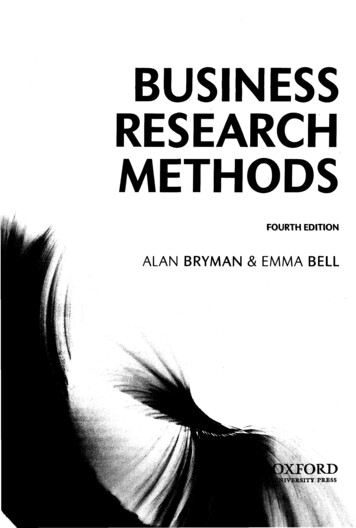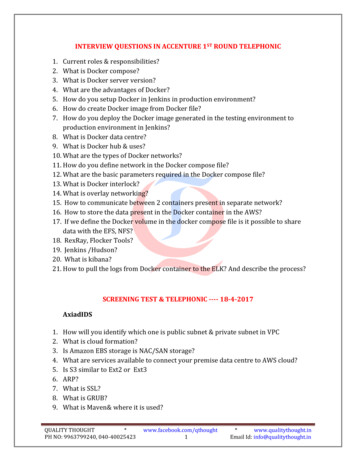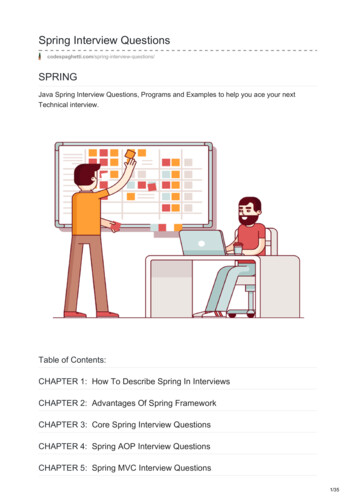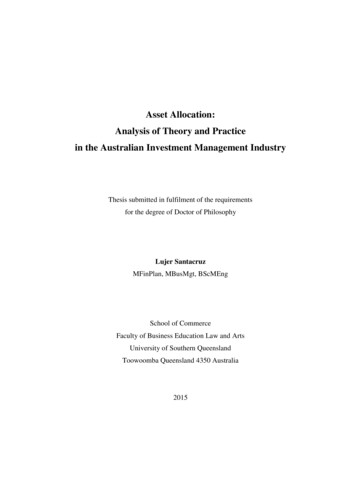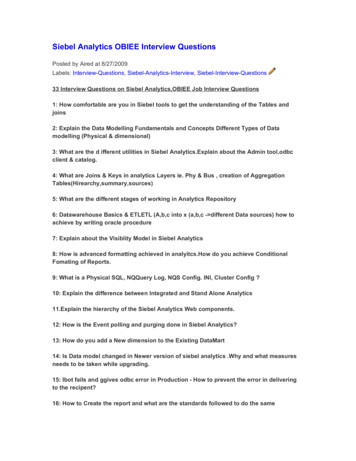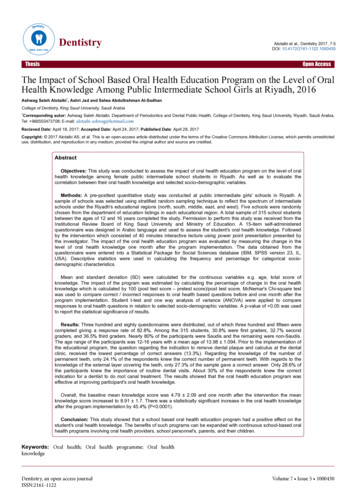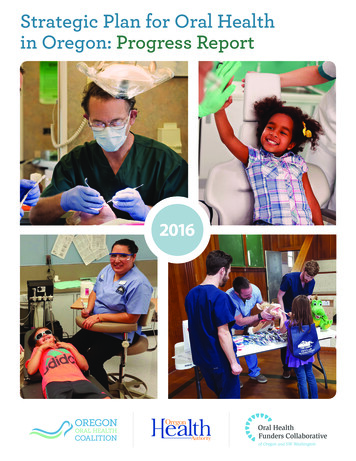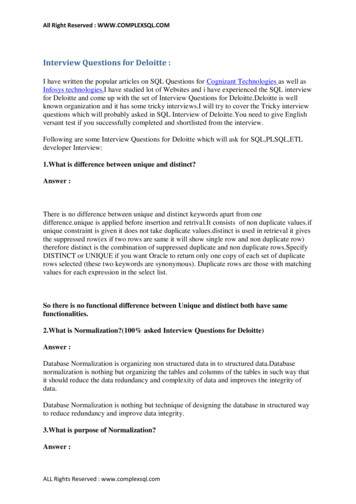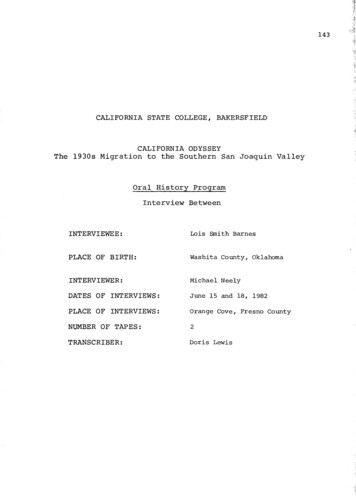
Transcription
143CALIFORNIA STATE COLLEGE, BAKERSFIELDCALIFORNIA ODYSSEYThe 1930s Migration to the Southern San Joaquin ValleyOral History ProgramInterview BetweenINTERVIEWEE:Lois Smith BarnesPLACE OF BIRTH:Washita County, OklahomaINTERVIEWER:Michael NeelyDATES OF INTERVIEWS:June 15 and 18, 1982PLACE OF INTERVIEWS:Orange Cove, Fresno CountyNUMBER OF TAPES:2TRANSCRIBER:Doris Lewis
143PrefaceMrs. Barnes is a charming and vivacious lady who has manyinterests and is always busy. We had pleasant interviews and spentsome extra time going over her large and fascinating collection of oldphotographs. Mrs. Barnes likes to write and she permitted me to readsome of her work.Mrs. Barnes lives in a home nestled among the trees of herorange grove. Behind the house is the packing shed where she and herhusband pack their oranges. She enthusiastically operated the machineryand provided me with a complete demonstration. I found her to be verybright and alive.Michael NeelyInterviewer
143CALIFORNIA STATE COLLEGE, BAKERSFIELDCALIFORNIA ODYSSEYThe 1930s Migration to the Southern San Joaquin ValleyOral History ProgramInterview BetweenINTERVIEWEE:Lois BarnesINTERVIEWER:Michael NeelyDATED:June 15, 1981{Age: 59 )M.N.:This is an interview with Mrs. Lois Barnes for the CaliforniaState College, Bakersfield CALIFORNIA ODYSSEY Project byMichael Neely at 24309 East Adams Avenue, Orange Cove,California at 1:00 p.m. on June 15, 1981M.N.:What is the first thing that you can remember?Barnes:I can remember coming to California in the truck with my folks.We were going to Armona to my aunt's place.I remember mymother telling me that I shouldn't do the Charleston anymorebecause my aunt wouldn't approve of it. That made me feel badbecause I sure like to do the Charleston. I was four yearsold.It must have been about 1926.M.N.:What was your mother like?Barnes:She was a Christian lady. She was very hard working. She justloved her home. She liked to raise chickens and can food forwintertime so that we would have enough to eat. She sewed andwas just a real good mother.M.N.:What did she look like?Barnes:She loved to eat. She was about five feet.She had beautifuleyes. She must have been Irish or German perhaps.M.N.:What was your father like?Barnes:He was pretty close to six feet tall.He was thinner and haddark brown eyes. That came from his Indian background.M.N.:Was he officially Indian?Barnes:No.His mother was half I think it was.His grandmother had
2Barnes, L.seen her parents killed when u.s. troops made the Indians leaveTennessee. The white people came in and killed all the Indiansin one village. She and her brother and sister ran into thewoods and escaped from it. Some good white people found themout there and took them home and raised them. That was a verysad thing.M.N.:What was your father like?Barnes:He was a very honest person. Hardworking. He didn't have mucheducation since he was the ninth child of twelve children. Thatwas back in Texas. They just couldn't send all those childrento school. They could hardly feed them. He started working onranches and riding horses.He just like the outdoors.M.N.:Was he a good man to be around?Barnes:Yes. He was.cowboy talk.M.N.:What do you mean?Barnes:Well, he swore.M.N.:How did that set with your mother?Barnes:I remember once I was pumping up a tube from a tire in thehouse and it made a funny sound.I said to my mother, "Thatsounds just like what Daddy says." She said, "What?" Irepeated a four letter word and she really jumped all over me.She said, "Don't you say that again!" I said, "Well, Daddysays it." She said, "Well, that's Daddy's problem. You justdon't say it." It was just his way. He never talked dirty oranything.It was just swearing.M.N.:You had an older brother?Barnes:Yes. He was three and a half years older than I was. He washealthy and strong and the outdoor type.I was skinny andlittle and just kind of spoiled I guess.M.N.:Let's get back to that early memory when you were going toArmona.Barnes:Times were hard then, even before the dust bowl. In 1926 my folksthought that they could get some work out in California. Wewent to Armona and stayed with my aunt a little while. Then werented a house in Armona.I remember them talking about theChinese who lived in Armona.I don't know if you've heardor not that it was an old Chinese place.I heard the grownupstalking about there being underground tunnels there.I don'tknow whether it was true. There were tunnels from one storeHe had his special way of talking which was
Barnes, L.3to the other.M.N.:What else do you remember?Barnes:My brother started to school there at Armona Academy. Iremember going to school with him one day in preparation forgoing to school the next year. I got so tired that I decidedI wasn't going to stay there at school. I just started offfor home by myself. I never would have found it. My brother,fortunately, saw me leaving and ran and caught me.We moved again out in the country near Armona. I don't remembermuch about that. After that we moved to Visalia. That wasabout 1927 or 1928. We just had a tent down there west ofVisalia near the stream or river. There are beautiful homesthere now. At that time there was nothing.My aunt came to visit us. I guess they decided that it was justa little bit too hard for this little skinny kid. They took meback to their house and took care of me for about a year. Afterthat we moved to a farm out west of Visalia. It was just rightout in the open field. I loved that place. We had animalsaround. My parents were working. That's where I met EileenBrown. She was my dearest, dearest friend. There was anirrigation ditch that went through there. At that time, parentsdidn't worry about their children swimming in the ditch. Itwas not unhealthful. We would just run down there and kickour shoes off and have a lot of fun.There were no trees around there. My mother built an arbor.She put four poles up and covered it with some palm leavesthat she picked up somewhere. She was so ambitious. She coulduse a hammer and saw and make things. That was our shade.She built most of her chicken pens and raised chickens andturkeys there. She started an egg route in Visalia. Shepicked up mushrooms out in the fields and took them to her eggcustomers. They always were so glad to get these nice, freshmushrooms. She knew the bad ones from the good ones. Shenever made anybody sick from her mushrooms. She was verycareful with them.M.N.:Sounds like a happy time for you.Barnes:Yes, it was. I just loved that farm. It was a three roomhouse. Just a little place. There was the kitchen and thefront room and then one long room where my mother, father,brother and me all slept. Most of the time my brother wouldrather sleep out in the barn. He'd take his bedding out there.He liked it better than being in the house. There was no insideplumbing. It was hard on my folks but I don't remember itbothering me.
. ,'Barnes, L.4M.N.:Did you have a lot of animals?Barnes:Yes. Horses, cows, chickens, turkeys, dogs, kittens and apet goat. We also had a dove we had raised with loving care.M.N.:Were the horses work horses?Barnes:My father didn't work them too much there. He worked on otherpeople's farms.I don't think we even farmed that placeexcept for a garden of fresh vegetables.M.N.:What kind of work did your father do?Barnes:Farm labor. That's all he knew. He liked it when he could getwork around horses.M.N.:He really liked horses?Barnes:He loved horses.In fact, his nickname was "Tex" because peoplesaw his cowboy hat and they figured he came from Texas.Thatmade him happy.He always wore cowboy clothes and boots.M.N.:Was it hard for your parents to make ends meet?Barnes:It was hard.to Arkansas.M.N.:What year did you go back to Arkansas?Barnes:1932. My mother lost a lot of her egg customers because peoplejust didn't have the money to buy. She'd lose a customer nowand a customer then. We saw it wasn't going to keep us in food.My father lost his job.It wasn't as hard there as after we went backThat was the hard part.My grandparents in Arizona had some property in Arkansas thatthey had homesteaded about 1900. They had eighty acres. Theytold my folks that if they'd move back there they would havefree rent. That would be one less expense so my folks startedgetting ready. They built two or three great big boxes aboutthree feet long and a couple of feet wide.We'd pack ourquilts and things in there.My mother started canning all the fruit she could get. Shesaved pieces of cloth because she knew that back there wewouldn't be able to get to the store to buy things.She wasreally a worker. She tried always to take care of her family.M.N.:How did you get ready for it?Barnes:I wasn't much help.I don't think I did too much.look forward to moving again.I didn't
Barnes, L.5M.N.:What was the trip like?Barnes:My mother drove this little Ford. My brother was along. Wehad our beds set up in the back part with canvas over it like acovered wagon. We'd sleep there at night. Under the beddingwere boxes of canned fruit and things.We both left August 26, 1932. It was late morning. TheRidge Route was just a two lane road. How brave my mothermust have been to start out with two kids in a car like thatto go 2,000 miles.M.N.:Where was your father?Barnes:He went in the wagon at the same time. We just went on. He rodedown the highway in this wagon with his mules and his dog.They wouldn't allow that now. He didn't go over the RidgeRoute. He turned off and went through Lancaster.M.N.:How long did it take him to get there?Barnes:That trip was 80 or 90 days. We got only one letter from him.We thought something must have happened to him. When no moreletters came we really worried. Finally, he came into Arkansaswhere we were.M.N.:He was all by himself?Barnes:All by himself with his dog. At night he would stop, camp,build a fire [and eat] biscuits and fried potatoes andalways his coffee. He was raised like that. That was nothingunusual to build a fire out to fix your food.We did the same thing as we went back. We camped along the roads.We'd never go to a motel. We didn't have fresh milk. We justhad canned milk.In the mornings we'd have Post Toasties andcanned milk. We got used to it.M.N.:How long did the trip take you?Barnes:It must have been eight or nine weeks.M.N.:Do you remember arriving in Arkansas?Barnes:Yes. We went to an uncle and aunt's place there near Kingston.That's Madison County. I remember them showing me how theykept their vegetables. They'd dig a hole in the ground andput them down in there. That kept them from getting too coldin the wintertime. The folks could always go out there anddig up some turnips. They also had lots of basements. Theyhad to have those basements and little smokehouses to storetheir food for the winter.
6Barnes, L.About a month or two after that we went across the mountainwhere my grandfather's and grandmother's homestead was. Thenmy father built a little two room house very, very fast becausewinter was coming.M.N.:What was that place like?Barnes:It was out in the woods on top of a mountain. We had a springto get our water. We didn't even have a pump. We just hadto go out and dip it out of the spring.M.N.:Was it good water?Barnes:Yes. It was very good.In fact, I think Arkansas has justabout the best water in the whole country.M.N.:Was that a pretty place to live?Barnes:Yes.It was just lovely there.In the fall the trees aregorgeous and then in the springtime there were mayflowers outin the woods. They're white. They smell nice and sweet.I'dnever heard a whippoorwill before that. There wasn't any workthere either. It was just as bad there as it was in California.My father would cut down oak trees on my grandmother's place tomake ax handles. He would whittle them out in the eveningssitting around the fire.He'd sell them for a little bit tomake some money. He also made staves.I remember him saying,"Well, I have to go out and get another load of staves andtake them in. "M.N.:It was a really hard time for your father.Barnes:Yes, it was. The only place to build a garden there was arocky slope on a hill.I remember him building somethingcalled a sled with some boards. The mule would pull the sled.My brother and I would go out and pick up rocks off of thelittle area where we were going to plant the garden. We gotenough rocks off of that place to. build a rock wall all aroundit. Then we planted corn and tomatoes and things.M.N.:Did it do well?Barnes:Yes. It did.spring.M.N.:What else did your father do to make a living?Barnes:That was just about it. There was no work at all around there.We got very hungry. One time all we had to eat was turnips.We just got so tired of turnips. My father said, "I think ourblood is going to turn to turnip juice." We had corn breada lot. Then we ran out of salt. We got used to eating cornbread with no salt.I still like corn bread.We had to really carry a lot of water from that
Barnes, L.7M.N.:But you don't like turnips?Barnes:Not very much.M.N.:Did your mother vary the way she made them?Barnes:Yes.M.N.:How long did that go on?Barnes:A month or two. Nothing but turnips. One time some folkscame over the mountain and brought us a big jar of sorghummolasses. Someone must have heard that we were having ahard time. That was all they had to share but they shared it.M.N.:They were probably hungry too?Barnes:Another thing that made it perhaps easier for them and not soeasy for us was that my mother and my brother and I wouldn'teat pork. My father would but he wasn't real crazy about it.So we didn't have the meat. We had lamb sometimes.I askedwhere he got the lamb. Well, it just happened that some sheepstrayed onto our place and he went out and killed it. That'sthe only dishonest thing I think I ever knew my father doing.I suppose he reconciled it with the fact that his kids werehungry.There weren't too many ways to do it.We spent two winters there. It was tough in that little house.The house was made of wet lumber and as soon as it starteddrying, cracks would appear and the wind would whistle through.We'd get cardboard and nail it up on the walls. Then, to makeit prettier, we would get old magazine pictures and paste themup.M.N.:It was a fairly simple house?Barnes:Very, very simple. No windows at first.I think later on wedid get two windows. When it was first built it was warmenough.M.N.:How many rooms did it have?Barnes:Two, the kitchen and the bedroom.M.N.:Did you go to school when you were there?Barnes:Yes. We went to a little one room school. It was called theCampground School. My mother had gone to that school whenshe was a child. My brother and I walked there.It wasn'ttoo far for kids to walk. The teacher was an eighteen yearold boy. He'd probably finished one year of college and neededthe job. It was a good thing they had a fellow teaching becausethere was a lot of big boys there that needed reprimanding.
8Barnes, L.We had a stove in the middle of the building.It was just oneroom. The blackboard was just wood painted black.It wasn'ta real blackboard. The chalk wouldn't stick very well but itwas enough to where the teacher could use it. We didn't haveany water in the school. The kids took turns going acrossanother hill and down a little valley to a spring to carrywater. All the kids would drink out of the same dipper.Iremember thinking that was not healthful, I would start drinkingcloser to the handle so my lips wouldn't touch where theirlips touched.END OF TAPE 1, SIDE 1M.N.:I remember you mentioning a black family that worked for you.Barnes:Yes. That was in Oklahoma.I was about three or four yearsold. My father was raising cotton qn the shares. This blackfamily lived right next to us. Their name was Smith, the sameas ours. We hired them to help us. They had a thirteen yearold girl who really loved to dance.She would take me by thehand. We'd go out there and start doing the Charleston.M.N.:Did she teach you to do the Charleston?Barnes:She was supposed to be pickingOh yes. Out in the cotton field.cotton.I was riding on my father's cotton sack.I was toolittle to pick cotton.M.N.:Riding on his cotton sack?Barnes:Yes. The sack was long.It's made of canvas. There is someway to put it around the shoulder. They just drag it alongbehind them. They pick the cotton and put it in there.I wasn't very big.I guess it wasn't much more of a load formy dad as he was picking cotton. The girl would come alongand she'd say, "Come on. Let's go." We'd run a few rows awayand start doing our Charleston. My mother would see the dustout in the field and know what we were doing. She didn't care.She did start caring later when people would start giving menickels and pennies to dance for them. She saw a dancer there.She thought, "Oh, my daughter is going to grow up to be adance hall girl." She didn't like that very well.I thinkshe was glad when we moved to California where she could get meinto another environment.M.N.:Do you remember how things turned out for that black family?Barnes:No.M.N.:Let's get back to that school.I don't.Where were you?
Barnes, L.9Barnes:In Arkansas. The Campground School. They used to have campmeetings there in earlier times. The school was also used asa church. It had a big bell on it. Around the school was agraveyard so we couldn't play in there. We did play Hide andSeek behind the gravestones. That is where I learned toalphabetize lists of words and names. The teacher sent us out toalphabetize the gravestones.I had a great uncle that wasburied there.M.N.:You liked school didn't you?Barnes:Yes, I did.M.N.:Were you a good student?Barnes:Not as good as my grandchildren are. Considering how manyschools I went to, I suppose I was good. I did like it.M.N.:What was your favorite subject?Barnes:I liked reading. I didn't care much for arithmetic. I likedto read history and poems. One time at recess, we heard anairplane at that little one room school. The kids were soexcited because they had never seen an airplane before. Canyou imagine? That was in 1932. I said, "I've seen an airplane."We had been in Visalia. They had the airport there. Nobodypaid any attention to me. They were looking at that plane.I kept trying to impress everybody how important I was becauseI had seen planes. I went around telling how I had even seena man jump out of one.I don't think they paid any attentionto me.That was quite a place. I remember one young couple who went toHuntsville to get married. Huntsville was about 20 miles away.This eighteen year old couple were each riding a horse goingto Huntsville. They stopped by our house to visit with us alittle bit. They had never seen a train. They were interestedbecause they were going to get to see a train while they wereon their honeymoon.M.N.:They were going to the big city?Barnes:The big city of Huntsville.M.N.:What else happened during that period of time?Barnes:We had made a friend in Armona. His name was Jack Ostrander.He lived alone. He was a widower. He worked in the depot inArmona. He liked us kids. When he found out that we weregoing to Arkansas he thought how much we were going to miss. HeHe had the Fresno Bee mailed to us. Every Sunday we got oneof the papers. We wanted to see the comics. We always lookedforward to going to Kingston and getting that paper. That'sin Madison County. It was the closest town.The population was about 1,000.
Barnes, L.10M.N.:Did you walk into town?Barnes:Oh yes. That must have been about four miles. The water wasup in the Kings River. We'd have to take a boat and rowacross.We went two seasons to school there. The first season we wentto the little one room school. The next season we went intoKingston to the bigger school. We had to walk four miles.M.N.:What was that school like?Barnes:I didn't like it very much.It was big and I was just a littlekid. My brother was always getting in fights.M.N.:Why would he get into fights?Barnes:I think all kids give the new kid a hard time. We were alwaysthe new kids.He was doing the protecting and I was doing therunning. When the weather was too bad we couldn't go out toplay. We would go down in the basement of the school and dosquare dances like "Skip to My Lou."M.N.:You liked that, didn't you?Barnes:I liked it.I didn't know the routines so I didn't get to dancetoo much.I was just a little scrawny kid. There were a lot ofbigger, prettier girls. They always got asked to dance and Ididn't.It was fun anyway.M.N.:Were the teachers as good there?Barnes:Yes. They were better. That's the reason we had to go intothat school. They didn't have enough teachers for the littleschool out in the country. Everybody had to go into town.They were good teachers.M.N.:Did things get better for your family?Barnes:It wasn't getting any better. My father had some New YorkLife Insurance. We couldn't pay on it anymore. We just didn'thave any money. The only way we could get out of thosemountains was to write and ask them to send the insurancemoney. That's how we got enough money to get out of there.M.N.:What year did you leave?Barnes:That was in 1935. We went over directly to King City. Weheard there was work there. My father and my brother startedworking near Salinas and Watsonville.M.N.:Do you remember your family getting ready to come back out to
11Barnes, L.California?Barnes:Yes.M.N.:Why were you happy?Barnes:I didn't like it there in Arkansas. For one thing, my dearfriend was in California.It seemed like California was myhome because my formative years had been here. We got prettyhungry in Arkansas. Plus the fact that I was used to levelland and back there we were up on the top of a mountain.All that we could see was the top of the other mountain ordown in a valley.I felt hemmed in. On the other hand, Isuppose most people who grow up in the mountains don't likethe lowlands.I love the big open sky.M.N.:What was the trip back out here like?Barnes:There were two cars. My uncle, aunt, their family and anotherfellow went with us. We would camp along the road and fix our food on campfires. My mother usually made biscuits in abig iron pot. She'd put some coals under it and put the biscuitsin there. My father loved biscuits. We usually had friedpotatoes that tasted really good.Sometimes, out in thedesert, there wasn't any wood.I remember my uncle and myfather going out with "tow sacks" picking up cow chips andbringing that back and burning it.M.N.:Did you eat better at that time?Barnes:We'd got that money from the insurance company and startedeating good.M.N.:Do you remember how much you got?:I remember how happy I was too.Barnes:It wasn't more than a few hundred dollars.It kept us untilwe got to King City. We rented a little house. At that timerent was very cheap. We must have paid 8 or 10 a month fora little two or three room house. My father and brotherstarted "bucking sacks." That's picking up the sacks of grainand putting them on the wagon or the truck out there in the grainfields.M.N.:Pretty rough work.Barnes:Oh yes.M.N.:That's pretty hard work for an almost 50 year old man.Barnes:Yes it is. My brother was around seventeen. Then we workedin apricots. My mother got to cut apricots and put them onthe wood trays to dry.I was very upset because I wasn'tallowed to do that. They could see how little and skinny IBut my father was strong and my brother was big.
Barnes, L.12was. They knew I couldn't do it.with a little girl.So I got a job babysittingM.N.:Was that really hard work in the apricots?Barnes:Yes.It's hard work cutting them and taking the pit out.You put the apricot on the tray and somebody takes it outin the sunshine to dry.M.N.:Sounds like they kind of took care of you?Barnes:Yes. I was the baby. I always felt loved.and I were always loved.M.N.:What was your house like?Barnes:In King City?It was just a little two or three room house.One thing I remember about King City was the beautiful peppertrees there. They were just lovely.M.N.:Are they still there?Barnes:Yes.M.N.:Did you start in to school right away?Barnes:No, I think we came over to Selma and I started school thereat the Roosevelt Grammar School.I graduated in 1936. The nextyear I went on to Selma High School and went there for threeyears. That was the longest I ever stayed in one school.M.N.:Did you like it there?Barnes:Yes.M.N.:Was church a big part of your life?Barnes:Yes, very much. My mother always took my brother and me tochurch. We couldn't go in Arkansas. We were too far away.When we came to California we could go back to church. Thatwas another thing that made it just feel better to me. Therewas security, happiness and singing.M.N.:Then church was a big part of your life?Barnes:Yes.It still is. I don't know how a person can live withouta foundation. Faith is very important to me.M.N.:It sounds like it had a strong impact on your family.Barnes:Yes, it did. My father was a good man but he never went tochurch with my mother.I think one of the reasons was thatIn fact my brotherIt felt like home.
13Barnes, L.he didn't want to get dressed up. He wanted to wear hiscowboy clothes all the time. He didn't want to put asuit on.I suppose he could have gone in the clothes thathe wore. Anyway, he just didn't go.M.N.:Your father doesn't sound typical. He doesn't sound likewhat a I picture a Grapes of Wrath person looking like.Barnes:Oh no. Every morning he would get his mirror out, his panof hot water, his shaving mug, and shave. He was very proudto keep clean and shaved like that.I remember how he wouldsing a lot. He liked to sing when he was out working with hishorses.M.N.:What would he sing?Barnes:Cowboy songs, whistle and kind of yoddle. Cowboys have to singto their cattle to keep them quiet. That was his life.M.N.:When I say Grapes of Wrath person, do you know what I mean?Barnes:I never saw the movie and I just read a little bit of thebook.I didn't really like the book too much.M.N.:Why not?Barnes:It offended me a little. It just wasn't like my family. Mymother didn't want us to carouse around or anything. She wasvery particular about what friends we had. She was alwaystelling me how I should go to school and get all the educationI could. She could see the results of not having an education.I remember how glad she was when I graduated from high school.She was very proud of me.M.N.:Your family wasn't just following the crops around?Barnes:No. Not too much. The only time I remember them followingthe crops around was that one summer. When we came back fromArkansas we had to get the money fast. That's when we went toArmona where we cut the apricots. We spent just the summerthere and then settled back in Selma. My mother did want usto be sure to go to school. We'd travel around when therewasn't any school.M.N.:How did you live when you were picking apricots?Barnes:We lived in a tent, ate outside and camped.M.N.:What was the tent like?Barnes:It was just enough room for a couple of beds. We cooked outunder an awning near some trees. A very primitive way of
14Barnes, L.living.It wasn't really comfortable. We didn't complainbecause we knew that that was all my folks could afford.You just have to make the best of it.M.N.:Did other children give you a hard time when you were in school?Barnes:It was hard to make friends.You go to a school. EverybOdyknows everybody and you're the new kid. By the time you reallyget a friend, you're gone to another school.I became rathershy and my brother did too.I know other families were poor too but I always had thatfeeling that we had to be very careful what we said. Wehad to keep very clean so that they wouldn't know that we werepoor. Once I got holes in the bottom of my shoes. We couldn'tafford more shoes. My mother said, "You just hold your headup and you smile. No one will ever know that you have holesin your shoes." That's the way it was.M.N.:Did you have new clothes?Barnes:Yes. My mother did a lot of sewing. She would make clothesand even shirts for my brother too.If we didn't have storematerial, there were always the feed sacks. They make prettynice little dresses. She was a good seamstress. If she hadany spare time she would be making quilts. One of the earliestimpressions I have is standing by the sewing machine and hersewing hundreds of squares of material for quilts.M.N.:Did she make them to sell?Barnes:No.M.N.:WellBarnes:Let's see. We're in Selma in 1939. Then, in 1940, my folksstayed in Selma and I decided that I wanted to go somewhereelse. I went to visit some friends down in Glendale. I wasbarely seventeen. They found I could stay with a family, bethe mother's helper, and go to Glendale Academy. That'swhat I did.I met the Harold Richards family. They hadfour children.I did what I could to help there. They werevery nice to me.M.N.:Was Glendale Academy a high school?Barnes:Yes.It was a private Adventist school. My mother wanted meto get some Christian education. That's why I went there.Just to use.now.I still have a lot of her quilt tops.What year are we up to?END OF TAPE l, SIDE 2
Barnes, L.Session Two145s2June 18, 1981M.N.:What about the inspection stations? Did you have any contactwith one of those when you came across from Arizona?Barnes:When I was about four years old we had the worst time.Iremember my folks talking about the trouble they were expecting.They had heard others who had gone through the inspectiontelling how rough it had been. When they packed their Model Ttruck back in Oklahoma, they put their canned goods right upbehind the truck seat. They built a false wall there becausethey had heard that at the inspection they always took thepeople's food away from them. These poor Okies would come inand have nothing to eat. They thought it was just ornerynessthat the inspectors did it. So we had all of our canned foodup there. When we got to the borderline we thought that theywere going to have us unload our truck. Sure enough. They did.Everything had to come out. They wanted to go through everything.The inspectors came to that false wall in the Model T truck andthey didn't go any further. We were just so happy because wewere going
This is an interview with Mrs. Lois Barnes for the California State College, Bakersfield CALIFORNIA ODYSSEY Project by Michael Neely at 24309 East Adams Avenue, Orange Cove, California at 1:00 p.m. on June 15, 1981 . M.N.: What is the first thing that you can remember? Barnes: I can remember coming to California in the truck with my folks. .
